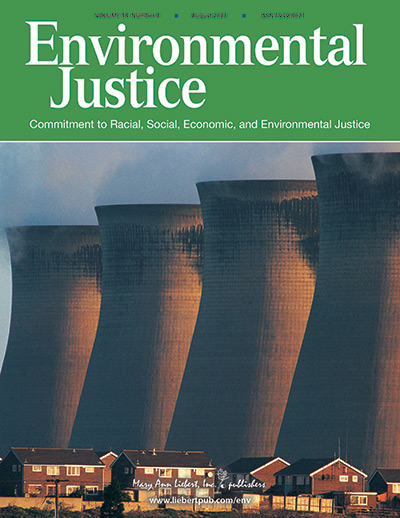Special Issue: Earth System at Risk: Challenging Environmental (In)Justice
Guest Editors:
Giusy Pappalardo, PhD
Assistant Professor, University of Catania
Department of Civil Engineering and Architecture
Catania, Italy
Elisa Privitera, PhD Candidate
University of Catania
Department of Civil Engineering and Architecture
Catania, Italy
Francesca Rosignoli, PhD
Junior Global Horizons Fellow
Swedish Collegium for Advanced Study, SCAS
Uppsala, Sweden
Growing scientific evidence and global climate activists warn that the current and future state of the Earth System is at risk. The discourse on the Anthropocene,1 including its terminological and conceptual variants,2-4 is uncovering existing as well as new forms of injustices. Notably, many places are destined to turn uninhabitable by jeopardizing the lives of entire populations either compelled to flee or forced to experience slow violence5 on a daily basis. Instead of accepting the inescapable injustice of our time as an “apocalyptic end to all things,”6 various streams of knowledge try to challenge it, giving space to transformative collective actions. The Environmental Justice studies — in its various nuances7-12 — open an arena for reflecting on activism and how it may empower marginalized communities.
This Special Issue will offer a journey into three dimensions of environmental justice,13 with an “undisciplined” approach informed by a blend of perspectives. We seek contributions that can offer practical insights — deriving from various fields of knowledge and activism — aimed at exploring the following dichotomies:
- spatial distribution vs. maldistribution of goods and hazards, both at the urban and rural scale
- recognition vs. misrecognition of a spectrum of vulnerabilities, such as people of color, low-income communities, future generations, etc.
- participation vs. exclusion of powerless communities facing obstacles to accessing justice
Resistant and resilient collective actions, including artistic and cultural forms of activism, may provide a shift from unjust maldistribution, misrecognition, and exclusion to a more just Earth System. To this end, this Special Issue welcomes contributions from political science, sociology, urban planning, geography, history, art, environmental humanities, and other relevant fields.
Topics for manuscripts may include, but are not limited to:
- The role of art, poetry, museologies, and cultural expressions as forms of collective resistance/resilience
- Injustices in spatial distribution and struggles for gaining ground to environmental justice
- State violence in the politics of environmental justice
- Social movements’ stand in just transition and struggles over renewable energy
- The transformative role of humanities to address environmental justice issues
- Engaged approaches to research aimed at challenging various forms of environmental injustices
- Critical analysis of policies and institutional environments in the light of the environmental justice discourse
Abstracts Submission Deadline: All abstracts should be submitted for consideration by February 28, 2022, including author information (name, institutional affiliation, email address), the title of the manuscript, a 250-word abstract, and up to 5 keywords.
Abstracts should be sent to the Guest Editors: Giusy Pappalardo, Elisa Privitera, and Francesca Rosignoli
Full-papers Submission Deadline: Following the notification of abstracts acceptance, all manuscripts should be submitted by June 30, 2022.
All manuscripts should be submitted online using Manuscript Central and will be subjected to blinded peer review.
The editors encourage submissions of multidisciplinary research articles up to 4,000 words in length (excluding notes and bibliography).
Visit the Journal's website to learn more, read past issues, and view author submission guidelines.
- Crutzen and Stoermer, 2000, https://doi.org/10.1038/415023a
- Haraway, 2015, https://doi.org/10.1215/22011919-3615934
Moore, 2017, https://doi.org/10.1080/03066150.2016.1235036 - Armiero, 2021, https://doi.org/10.1017/9781108920322
- Nixon, 2011, https://www.degruyter.com/document/doi/10.4159/harvard.9780674061194/html
- Dalby, 2013: 191
- Pulido, 1996, https://onlinelibrary.wiley.com/doi/abs/10.1111/j.1467-8330.1996.tb00519.x
- Pulido, 2018, https://doi.org/10.1177/0309132516686011
- Martinez-Alier, 1997
- Martinez-Alier, 2018
- Agyeman et al., 2003
- Pellow, 2017, https://www.wiley.com/en-us/What+is+Critical+Environmental+Justice%3F-p-9780745679372
- Schlosberg, 2007, https://oxford.universitypressscholarship.com/view/10.1093/acprof:oso/9780199286294.001.0001/acprof-9780199286294
- Agyeman, 2005, https://nyupress.org/9780814707111/sustainable-communities-and-the-challenge-of-environmental-justice/
- Sze, 2020, https://www.ucpress.edu/book/9780520300743/environmental-justice-in-a-moment-of-danger
- Klein, 2014, https://thischangeseverything.org/book/
